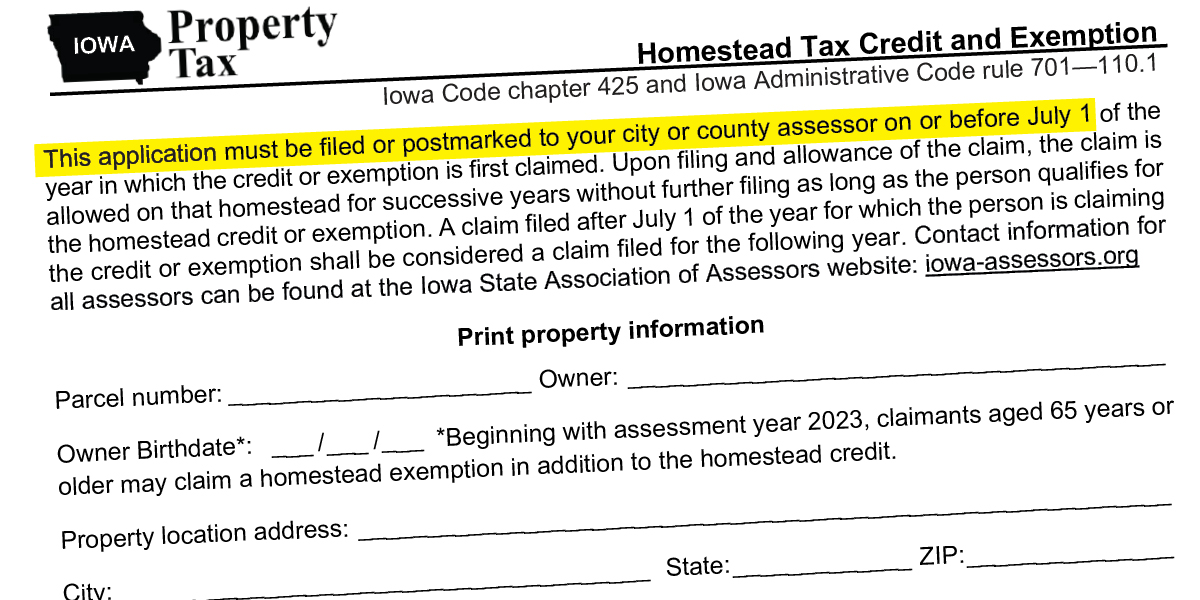Seniors and Veterans – Get Your Property Tax Cut
ITR believes ALL Iowans deserve property tax relief.
One of our Five Principles of Sound Tax Policy states that Iowa’s tax code should be fair and not favor one group of taxpayers at the expense of another. But, this principle does not mean taxpayers should not take advantage of every opportunity to reduce their tax bill.
The property tax reform legislation recently signed by Governor Reynolds will directly cut tax bills for seniors and veterans. Below are details of who qualifies and what they need to do.
Iowans 65 and Older:
Iowans who were 65 or older on January 1, 2023, will receive a homestead exemption for their principal residence starting with the bill due in September 2024.
You need to act now! There is a July 1 deadline.
Those who qualify MUST SUBMIT AN APPLICATION to their city or county assessor before July 1, 2023. Iowans who turn 65 in future years will need to file the form before July 1 of the year following their 65th birthday. The application only needs to be submitted once unless the taxpayer moves to a new primary residence.
How much will this lower property tax bills?
The new law provides a $3,250 exemption for the most recent assessment done in 2023. It will then increase to $6,500 for the 2024 assessment year.
The amount of savings will vary across Iowa because consolidated property tax rates differ from community to community. Jeff Robinson, senior fiscal legislative analyst at the Iowa Legislative Services Agency, estimates seniors will receive a:
- $109 Average Annual Tax Bill Reduction for FY 2025 ($54.50 in September 2024 and $54.50 in March 2025)
- $219 Average Annual Tax Bill Reduction after FY 2025 (split between September and March bills)
Robinson notes, “The average benefit is based on the statewide average tax rate. If a particular home is subject to a property tax rate higher than $33.65 (per $1,000 taxable valuation), their benefit will be higher. Lower than $33.65 means a lower tax benefit.”
What is a homestead exemption?
A recent ITR Foundation article by Sarah Curry explains that exemptions reduce property taxes (in most cases) by exempting a certain amount of a home’s value from taxation. However, the downside to this relief program is that it is more taxpayer-active than other forms of tax relief because taxpayers must apply for their relief.
Curry says, “While this new policy will provide relief soon, it will be short-lived if local governments are not given a spending limitation. After 1937 when the original homestead credit was enacted, it took city, county, and school taxing districts only a few years to increase their spending enough to completely offset a homeowner’s entire credit. History will replay itself if local governments are not subjected to a hard spending cap to prevent the erosion of this exemption and other relief efforts included in the new legislation.”
Military Service Property Tax Exemption:
The military service property tax exemption will increase from $1,852 to $4,000, starting in FY 2025. This tax break is available to “an honorably separated, retired, furloughed to a reserve, placed on inactive status or discharged veteran.”
Veterans who already receive the exemption DO NOT NEED TO RE-APPLY, but new applicants must submit the application form by July 1.
Using the same statewide average tax rate, Robinson estimates that the annual benefit to veterans will increase from $62 to $135 per year.

